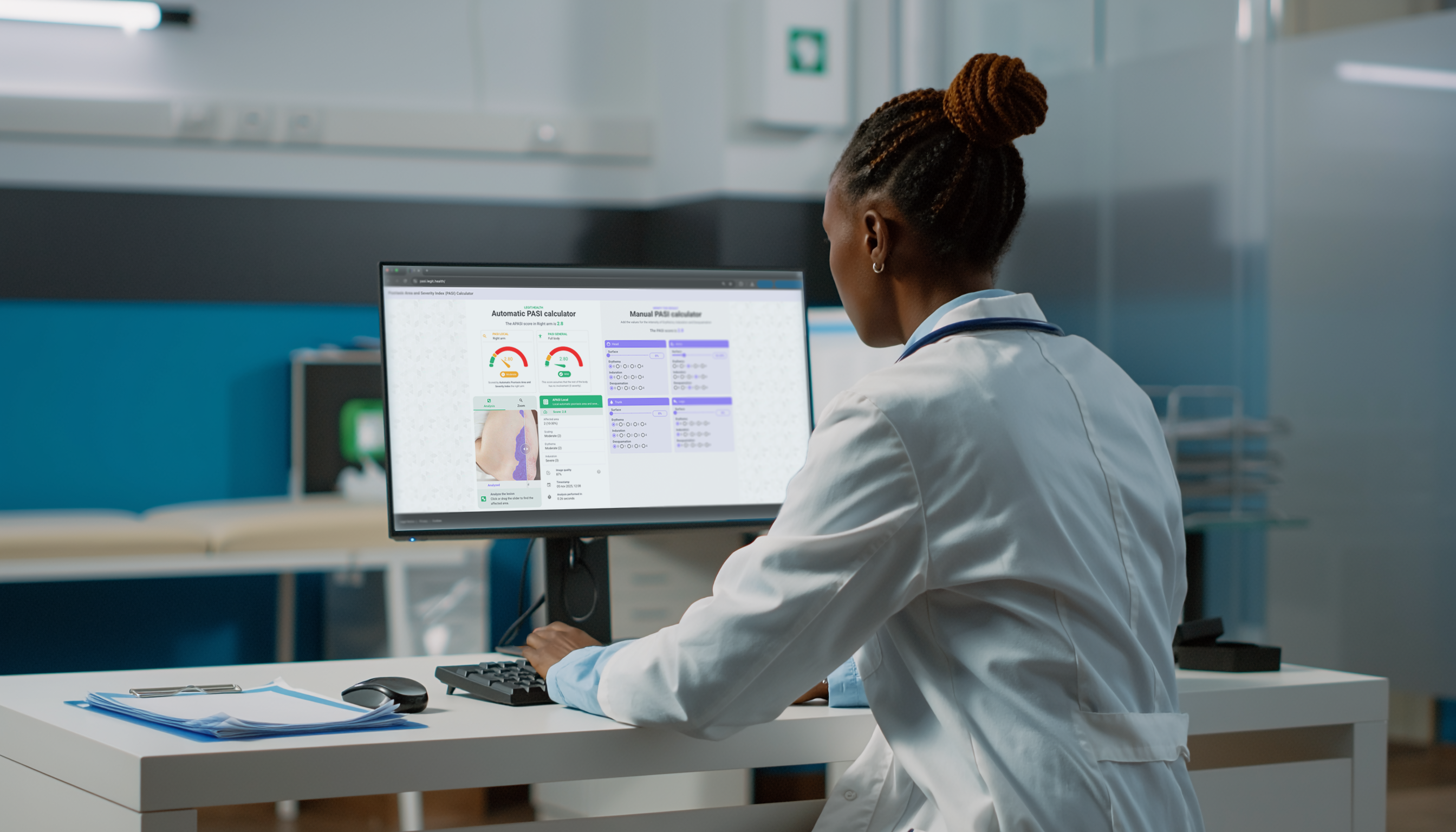APASI: The AI-Powered Automatic Psoriasis Area and Severity Index
Introduction
Legit.Health presents a groundbreaking advancement in dermatological assessment technology: the APASI (Automatic Psoriasis Area and Severity Index) system. This innovative solution harnesses the power of artificial intelligence to analyze clinical images and automatically calculate standardized PASI scores, transforming how psoriasis severity is evaluated in clinical practice.
The development and validation of APASI have been documented in a comprehensive scientific publication in JEADV Clinical Practice:
APASI provides a robust AI-driven framework for psoriasis severity assessment, delivering rapid, objective, and precise evaluations. Its integration into clinical and research workflows could enhance disease monitoring, improve treatment assessment and reduce evaluation costs.
The need for objective and reliable measures in psoriasis assessment has never been more critical. While the Psoriasis Area and Severity Index (PASI) remains the gold standard for severity assessment, it faces limitations such as subjectivity, limited sensitivity for small lesions, and high interobserver variability. APASI addresses these challenges by providing an automated, standardized approach to severity scoring, marking a significant advancement in dermatological care and clinical research.
The challenge in psoriasis assessment
Psoriasis affects approximately 125 million individuals worldwide, manifesting as erythematous plaques with silvery scales that significantly impact patients' quality of life. Despite the clinical visibility of psoriasis lesions, achieving consistent and objective severity assessments remains challenging, particularly in clinical trials where interobserver variability can compromise evaluation accuracy.
Traditional assessment methods like PASI, while widely accepted, present several limitations:
- Low sensitivity to small affected areas
- Significant interobserver variability
- Time-consuming manual measurements
- Subjective interpretation of visual signs
The APASI Solution: Revolutionary AI-powered psoriasis assessment
APASI represents a breakthrough in dermatological care, seamlessly blending cutting-edge artificial intelligence with decades of clinical expertise. This innovative system transforms how healthcare professionals evaluate and monitor psoriasis, making the process more objective, consistent, and efficient than ever before.
At its core, APASI excels in two critical aspects of psoriasis assessment:
-
Intelligent Lesion Detection: Our advanced AI system can identify and measure psoriasis lesions with remarkable precision, even detecting subtle changes that might be missed by the human eye. This capability ensures that no affected area goes unnoticed, leading to more comprehensive treatment planning.
-
Comprehensive Severity Analysis: APASI evaluates the three key indicators of psoriasis severity with exceptional accuracy:
- Erythema: Precisely measures the degree of redness in affected areas
- Induration: Accurately assesses the thickness of psoriatic plaques
- Desquamation: Evaluates the extent of scaling with remarkable detail
The power of AI in clinical practice
Behind APASI's user-friendly interface lies a sophisticated AI engine that has been trained on thousands of clinical cases. This powerful technology processes and analyzes clinical images with remarkable speed and accuracy, providing healthcare professionals with reliable, objective assessments in seconds. What's truly groundbreaking is that APASI's performance matches or even exceeds that of experienced dermatologists in many aspects of psoriasis evaluation.
Evidence-based excellence: Validation through rigorous testing
APASI's capabilities aren't just theoretical - they're proven through extensive real-world validation. Our system has been tested against a comprehensive database of clinical cases, representing the full spectrum of psoriasis presentations. This rigorous validation process, involving multiple expert dermatologists and thousands of clinical images, demonstrates APASI's reliability and accuracy in real-world clinical settings.
Ways in which APASI enhances psoriasis diagnosis
Precision and efficiency in clinical practice
APASI revolutionizes psoriasis assessment by combining unprecedented accuracy with remarkable efficiency. The system eliminates traditional subjective variations through standardized measurements, while transforming time-consuming evaluations into quick, automated processes. This allows healthcare providers to focus more on patient care and less on administrative tasks.
Advanced monitoring and decision support
Through comprehensive visual tracking and intuitive progress reports, APASI enables healthcare providers to monitor treatment effectiveness with exceptional clarity. The system's ability to detect subtle changes and provide objective data supports more informed clinical decisions, leading to optimized treatment strategies and better patient outcomes.
Advancing research and clinical trials
In clinical research, APASI sets new standards for data quality and consistency. By standardizing assessment methodology across multiple research sites and generating rich, quantifiable data, the system is accelerating the development of new treatments and deepening our understanding of psoriasis management.

Future implications: Transforming dermatological care
APASI marks the beginning of a new era in dermatological assessment technology, transforming both clinical practice and research. Healthcare providers now have access to unprecedented accuracy in disease monitoring and documentation, leading to more informed treatment decisions. In clinical trials, APASI's standardized approach and reliable data collection are revolutionizing research efficiency, while its advanced analytical capabilities are accelerating scientific discovery in psoriasis treatment. This convergence of clinical precision and research innovation is paving the way for better patient outcomes and more effective therapies.
Conclusion
APASI represents a significant advancement in psoriasis assessment, offering an objective, rapid, and precise evaluation tool that complements traditional clinical assessment methods. Its integration into clinical workflows promises to enhance the quality of patient care while providing valuable data for research and treatment optimization.
The system's ability to match or exceed expert dermatologist performance in certain aspects, combined with its standardized approach, positions APASI as a valuable tool in the future of dermatological care and clinical research.
For more information about implementing APASI in your practice or research, visit Legit.Health.
We also encourage you to read the whole publication.
Mac Carthy T, Dagnino D, Medela A, Fernández G, Aguilar A, Martorell A, Gómez-Tejerina P, Roustán-Gullón G. Artificial Intelligence-Based Quantification to Assess the Automatic Psoriasis Area and Severity Index. JEADV Clin Pract. 2025. https://doi.org/10.1002/jvc2.70143
Work with us
At Legit.Health, we are working to further improve the technology of APASI, striving to create even better tools. This includes, for example, improving the differentiation between types of psoriasis lesions, or ensuring that the technology works correctly across all skin phototypes.
If you would like to work with us, please fill out the following form and we will contact you as soon as possible.



